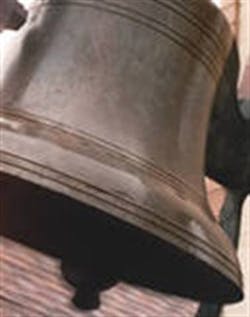Industry experts predict that major brand market share will grow this year at the expense of private label gains. But independent tire dealers say private brands will continue to be powerful weapons in their efforts to boost sales margins and preserve their autonomy in the face of growing demands being placed upon them by major manufacturers.
Walt Dial Jr., president of Appalachian Tire Products Inc. in Charleston, W.Va., has been selling TBC Corp.'s Cordovan brand passenger and light truck tires for nearly eight years. Prior to that, he marketed a variety of other private label products -- "whatever our customers needed at the time."
The Cordovan line has been key to the 22-outlet dealership's retail and wholesale success, Dial says. "At the retail level, it helps us compete with mass merchandisers who are selling major brands."
TBC also gives its dealer members the freedom to sell its products "at prices they can live with," he says, which comes in handy when competing with big box outlets that can afford to low-ball prices due to their superior purchasing power.
Territorial exclusivity is another advantage provided by private brands, according to Dial -- especially when distributing tires to fellow dealers. "You don't have the same tires that everyone else is carrying." Appalachian Tire is the only Cordovan dealer in the state of West Virginia, he says.
"Purchasing is usually easy with private brands, too. TBC comes up with one truck-load price and we can mix and match sizes and types. It's harder to do that with major brands."
Kevin Wild, owner of Wild's Car Care & Tire Center in Baton Rouge, La., picked up SURE Tire Inc.'s Remington private label line three years ago to increase the number of sales options at his single-location store, which up until that point primarily sold Goodyear tires. "You walk into an electronics or grocery store, you want choices," he says. "Private brands give customers that."
Often after looking at Wild's major brand offerings customers will ask to see what else he carries. "Sometimes in the end they decide to go with Goodyear, but they still like to know they have options." Goodyear Tire & Rubber Co. makes Remingtons, along with SURE's Summit and Heritage labels.
Wild buys Remington passenger and light truck tires from Area Wholesale Tire, a large Baton Rouge-based distributor. Due to limited warehouse space, he stocks one set of Remingtons for every three sets of Goodyears, "but they carry all the stuff we need and we can order on a daily basis."
Occasionally some customers who've never heard of Remington question the brand's quality, according to the second-generation dealer. He eases their worries by telling them he and many of his employees use Remington products on their own vehicles. If they're still unconvinced, Wild points out features and benefits of the tires. "We also tell them we don't get many back due to manufacturer defects."
Once Wild finishes pushing quality, he sells customers on price. Price differences between major label and private brand tires may not be much at the "cheap, rock bottom" level, "but in the middle-to-upper end, private label tires get less expensive -- usually $15 to $20 less per tire."
Garland Smith, owner of Metro Tire & Service Center in Arlington, Texas, also uses private label tires to flesh out his single-store dealership's price points. "I have some customers with older work cars and they aren't looking to put premium, high-dollar tires on them. But they still want a good tire."
Smith markets American Car Care Center's (ACCC) American brand as his main private label offering. He sells the 60,000-mile American passenger tire in the popular P235/75R15 size for $62 a unit, while an equivalent Michelin-brand product generally sports a $120 price tag. That difference means a lot to Metro's bargain-minded customers, and Smith as well. "It gives us a shot at them."
The Laramie Federal tire, made by Goodyear and distributed through Treadways Corp., opens the doors to customers who want to spend even less money. "We sell a 205/60R15 for around $49," Smith says. The tire also is a hit with Metro's heavily Hispanic clientele "because it has a label on it that looks like the Mexican flag. That attracts them, too."
Every independent tire dealer needs a niche, according to Rene Therrien, owner of Central Tire Co. Inc. in Sanford, Maine. Central Tire has been selling Hercules brand tires since Rene's father, Arthur Therrien, started the dealership in 1952. (Arthur, along with several other dealers, also bought Atlas Rubber that same year, which evolved into Hercules Tire & Rubber Co.'s Rubber Division.) "Everybody is selling Goodyear, Michelin and Bridgestone/Firestone," he says. "They're giving the stuff away. You want to sell something at a good gross profit. It's economics!"
Hercules brand tires comprise 85% of Therrien's retail sales. "Some of my competitors tell me, 'You have everyone believing that Hercules is a major brand!'" he jokes.
Most of Central Tire's customers accept Hercules as being equal to major brand counterparts when it comes to quality and safety, he says. Cooper Tire & Rubber Co. makes half of the private label products Therrien sells, a fact he actively promotes. "Cooper's recognized as a top tiremaker."
Other Hercules manufacturers include lesser-known companies like Kumho Tire and Nexen Tire Corp., which is rarely a stumbling block for Therrien's customers. "I tell them, 'Look at your ball cap; it's made in China. That banana you bought is probably from Costa Rica.' It's a world market; if you don't make a quality tire, you won't be in business -- I don't care who you are."
Central Tire's private label selection also protects the dealership from market shifts caused by the growing number of mass merchandisers in its area. "There's a Wal-Mart next door to me that didn't put in a tire shop," Therrien says. "They must have shopped us several times to see what we do and they know they can't overwhelm me."



